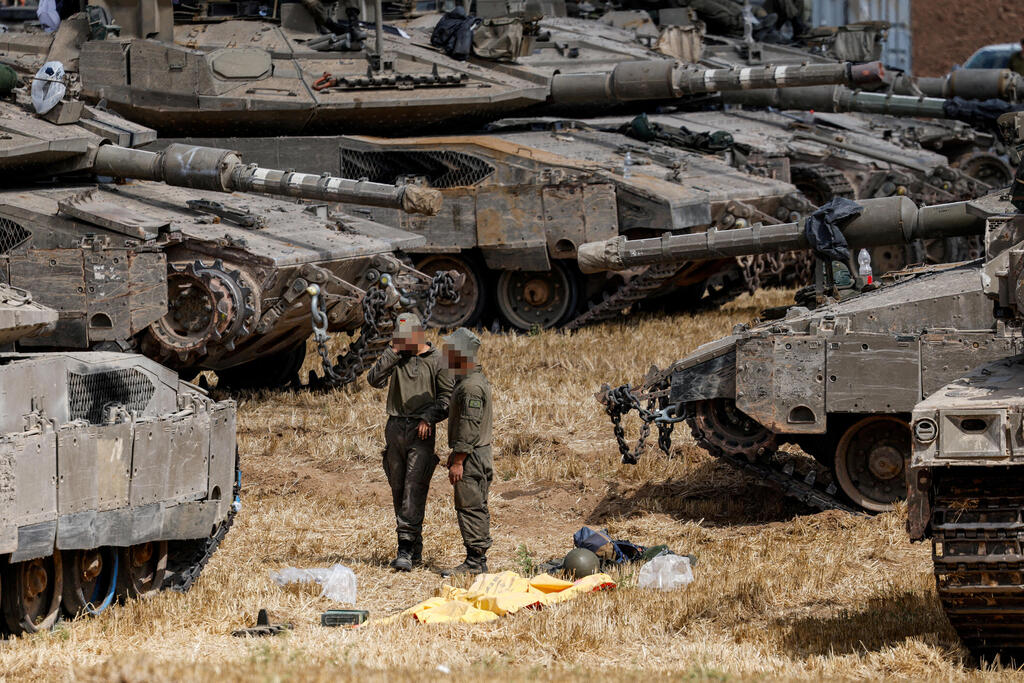The IDF says it has achieved the fastest battlefield medical evacuation times in the world during the ongoing war in Gaza, citing operational reforms, advanced technology and an expanded corps of frontline medics.
Data released Thursday by the military shows that wounded soldiers in the Gaza Strip are being evacuated to hospitals in about 51 minutes by helicopter and 61 minutes by ground vehicle — a significant improvement over the 90-minute average during the 2014 Gaza war. The military says this is the fastest recorded in any armed conflict worldwide.
Medics save lives on the battlefield in Gaza
(Video: IDF)
Since the start of the war, the Medical Corps, which operates under the Technological and Logistics Directorate, has treated roughly 7,400 wounded personnel. Medical teams accompany the injured from the point of injury through hospitalization and rehabilitation, often while under fire.
In helmet camera footage released by the military, a medic can be heard saying, “I’m with you — lead me to the injured. Take off your boots, take off everything. Battalion commander, we have five wounded, all conscious. I need at least three more evacuation APCs. Head injury — conscious. Two lying down. Urgent evacuation needed.”
The IDF attributes the drop in evacuation times to multiple factors, including an increase in the number of senior medics deployed with combat units and a faster response time. Senior medics now reach wounded soldiers in as little as one to four minutes, compared to 25 minutes during the 2006 Second Lebanon War.
The military says these efforts have reduced the case fatality rate — the percentage of wounded troops who die — to 7.1 percent in the current war, down from 15 percent in the Second Lebanon War. Six times as many critically wounded soldiers have survived compared to that earlier conflict, and three times as many compared to the 2014 war.
(Video: IDF Spokesperson's Unit)
Technological innovations have also played a key role. The IDF is developing a smart, automatic tourniquet and a drone capable of delivering refrigerated blood directly to the battlefield without supply convoys. The drone, created in cooperation with the Ground Forces’ Technological Division and the Defense Ministry’s research unit, is expected to become operational this summer.
Medical documentation systems have also been upgraded to allow real-time tracking of casualties and communication between frontline medics and command centers. One of the developers of the system is an elite combat soldier who was injured on Oct. 7 and later returned to serve as a product manager.
The IDF also reported that 1,300 soldiers are now attached to RAM 2, a network of medical support units based in hospitals for troops unfit for regular service. That number is 2.5 times higher than before the war. Roughly 80 percent of injured career soldiers treated through RAM 2 have returned to duty.
Get the Ynetnews app on your smartphone: Google Play: https://bit.ly/4eJ37pE | Apple App Store: https://bit.ly/3ZL7iNv
The military says it has expanded its mental health services significantly. More than 1,000 mental health officers have been active since the war began, and for the first time, they have entered combat zones in Gaza and Lebanon more than 80 times to provide support directly to combat units.
The number of suicides in the military rose to 21 in 2024, up from 17 the previous year and 12 in earlier years. While the IDF says the increase is not disproportionate given the surge in active-duty personnel, it has taken a proactive approach, launching a mental health hotline and initiating outreach to thousands of soldiers.
A new clinic called “Tatzumot” was established to treat post-traumatic stress, and roughly 800 personnel — 90 percent of them combat soldiers — have been treated there. The IDF says that 85 percent of those treated in its Combat Reaction Unit have returned to service.
In addition to battlefield care, the IDF has expanded its general healthcare system, which now serves a much larger population of regular and reserve soldiers. During the war, about 280,000 dental treatments and 133,000 physiotherapy sessions were provided, including in combat zones and near-border readiness centers.
The IDF has also upgraded its medical app, introduced AI-powered tools and is creating an online health center to consolidate all remote services. A partnership with Maccabi Healthcare Services will soon allow soldiers to receive lab services at over 400 locations across Israel.
Wait times for specialists have dropped by 20 percent since 2023. The average wait for a gynecologist or ophthalmologist is now under 10 days.
The military says it has also made services more accessible, including agreements with civilian pharmacy chains that allow soldiers to pick up prescriptions more easily.
As the war continues, officials say they plan to keep expanding battlefield care and mental health services, while sharing successful innovations with the civilian healthcare system.






